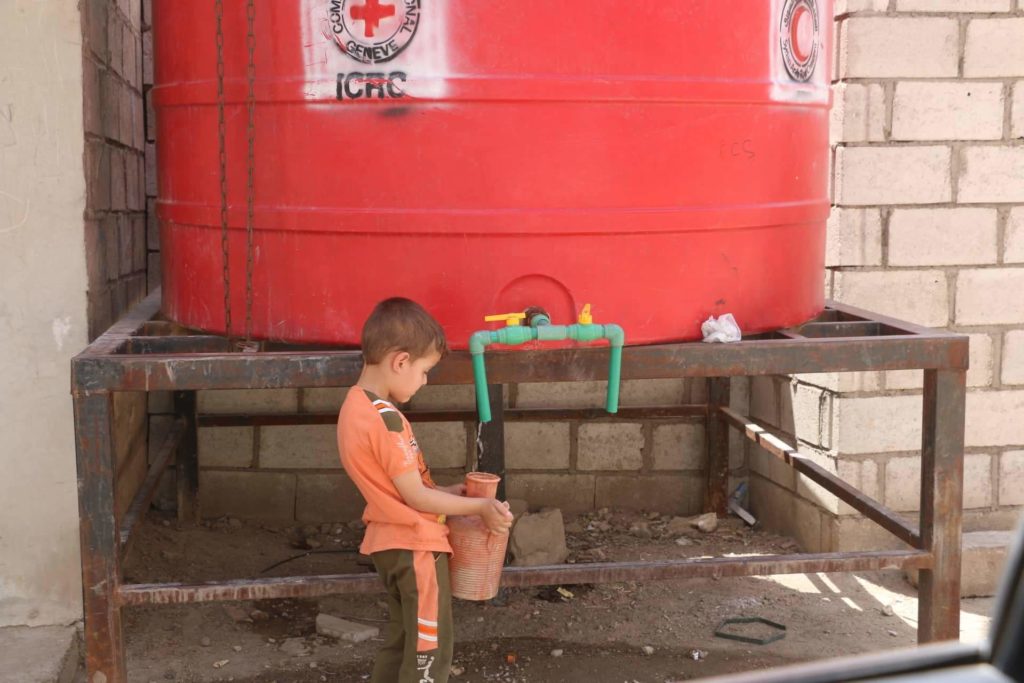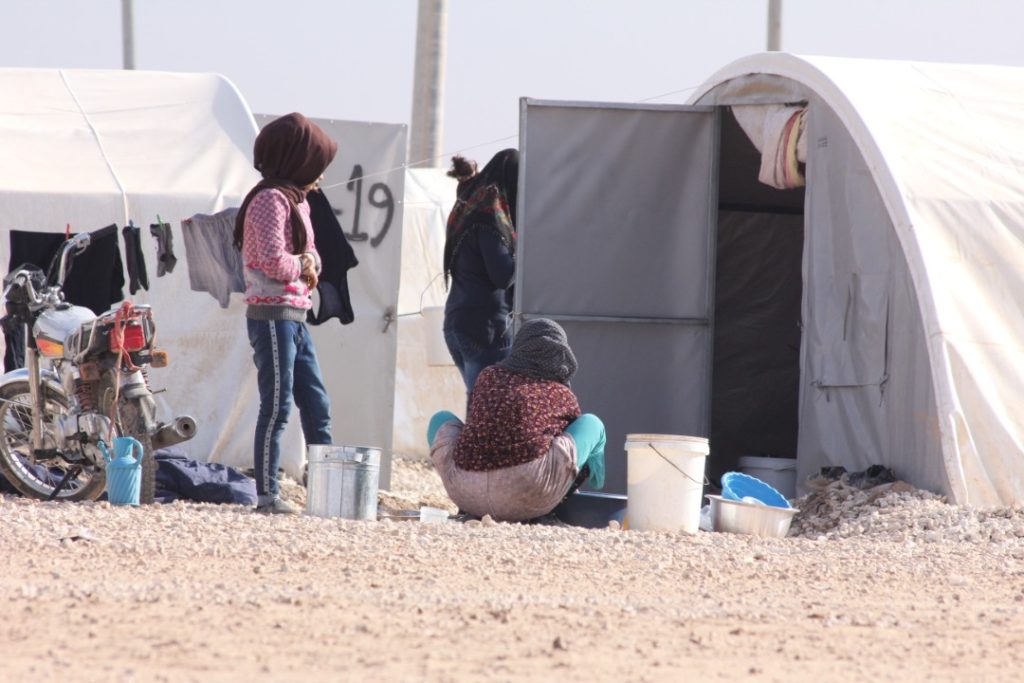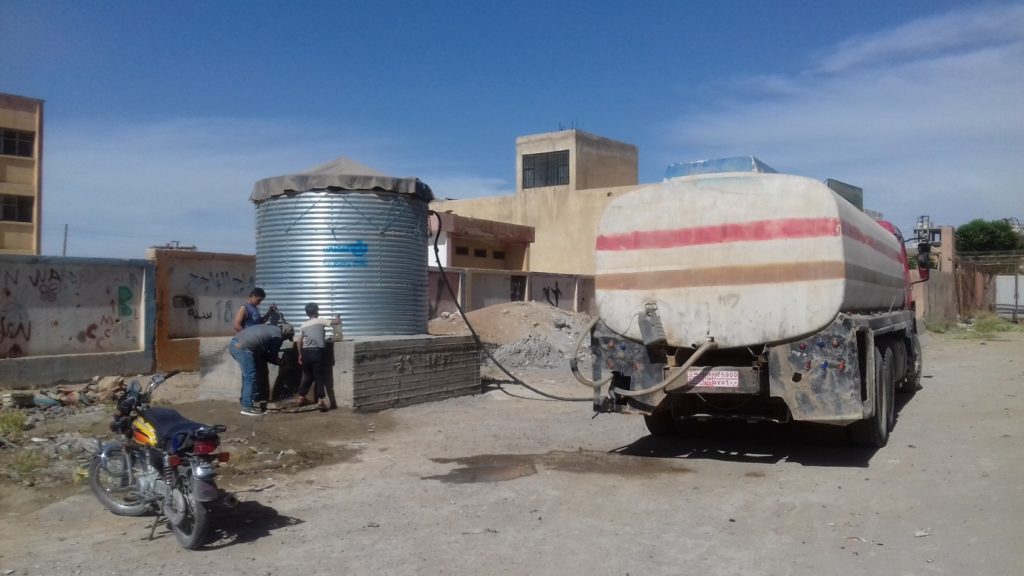متوفر باللغة العربية أيضاً
Bi Kurdî jî peyda dibe
Alya Muhammed
This publication was produced with the financial support of the European Union. Its contents are the sole responsibility of Alya Muhammed who prepared this material in the favor of the partnership between Nextep Organization and Welat FM and do not necessarily reflect the views of the European Union.
With her three-year-old child in her arms, Jalila Hussein waits for her turn every morning to get enough water for the rest of the day. She stands in a queue with other displaced people in the yard of Ismail Toqan school in Hasaka city of northeastern Syria.
Inside that school, which contains roughly 40 displaced families, there is only one water tank. This amount of water is usually adequate for only one family. Thus it is difficult to obtain water in most cases, given the large number of families sharing this water, as Jalila tells Welat FM.
“In the nearby school inhabited by displaced people from Ras Al-ain city, there are ten water tanks while we have only one. We are also human beings like them, and we get upset about the unfair distribution of water. My son is disabled, and I can’t leave him alone in our room at school, so I have to take him with me and wait at the water tank. Sometimes we stay for an hour until we get our share, and sometimes we return empty-handed; it is all because we have only one tank.”
Disagreements occur among those living in the same school, which was converted into a shelter for the displaced, according to Mahmoud Hameed, who receives between 25 and 50 liters of water per day to meet his and his eight-member family’s needs.
“The water runs out an hour after filling the tank, some families can not take their share of water some days, so there are continuous arguments among them, as some take twice as much as others,” said Hameed.
Walking from the shelter center to the city’s neighborhoods will allow you to see people busy securing water for their houses. All they talk about is the water that is repeatedly cut off, and who has the right to withdraw water using the water pumps set on wells dug inside their houses during the hours of power supply for those neighborhoods. It is the method used by the people to obtain water, although it is not drinkable. Usually, the neighbors quarrel on this matter especially since the electricity cuts off for long hours, explains Teamam Saeed, an inhabitant of the Aziziya neighborhood.
“When I see my neighbor filling up his tanks and wasting water, I get irritated … bickerings and disputes have arisen among the people over water and will continue to happen more unless the issue is resolved. They even happened a lot between my neighbors and me as some get water and others are deprived of it!”
The bickerings and disputes that occur among people in Hasaka city could be ascribed to several reasons, including the hard-living reality and the poor services, especially those related to the water supply. This imposes its effects on community cohesion, not only among the different communities but even among one community, according to Abas Ali Musa, a civil activist and the director of the community cohesion project in Demos (a civil society organization).
“There are various reasons for the water shortage. One may have a dispute with his/her neighbor, or there may be issues with wells or water distribution services provided by the municipal. All of these factors can cause problems among people since these problems could arise over water service, not on the basis of their affiliation to a particular community.” said Abas Musa.

The water crisis is not an emergency in Hasaka city. It was exacerbated after October 2019 i.e. after Turkey and its affiliated opposition factions took control of Ras Al-ain/Sarei Kaniyei, where Alouk station is located. Alouk is the only source of drinking water for hundreds of thousands of people in Hasaka city. In addition to being the main source that supplies the camps of Hol, Arisha, and Twaina which include tens of thousands of internally displaced people from different regions of Syria.
Solutions that increase disagreements among the inhabitants
This crisis prompted the adoption of emergency measures, including distributing water via water tankers by the Water Directorate of the Autonomous Administration and others provided by some international organizations, in addition to private ones. However, people are always complaining about this service. One complainant is Fawzia Al-Ahmad, who sits a few steps away from her neighbor Tamam. Fawzia also complains about the water contamination that causes stomach and kidney diseases, pointing out that disputes occur daily as a result of this crisis in the city.
“water disputes happen daily between my husband and our neighbor’s son. I do not want my husband to be at home when water is being pumped so that no bickering happens between him and our neighbor. Not only this but the water we get is contaminated. A few hours ago, I was in the health center for this reason; I had enteritis because of water.”

Others were interviewed about their water tankers-related suffering. Most of them talked about similar diseases resulting from the poor quality of the water they drink. On his part, Ahmed Al-Faraj, a specialized water engineer from Hasaka city, explains the reasons:
“Some of the private tankers through which water is distributed do not take into account sanitary conditions, as they are used in several places,” said Al-Farag “for example, some of them wash camps toilets and then use the same tanker’s hoses to distribute water inside neighborhoods,” he also pointed out that “The water of organizations’ tankers is usually clean so that disputes happen over it once some could obtain it, and some couldn’t.”
Speaking to Welat FM, Majda Amin, the co-president of the Municipalities and Environment Committee in Hasaka Canton (affiliated with the Autonomous Administration), underlined that the Committee undertakes the water distribution via approximately 50 tankers under the supervision of the Water Directorate. It takes place in cooperation with the local councils, according to their registries and in accordance with their evaluation, to avoid distribution inequality. She pointed out that the water distributed via some private tankers causes many diseases because it is not sterilized.

Majda added: “Some disputes occur, and some families file complaints. For our part, we review the registries, evaluate the situation through our special committees and try to intervene and solve the problem through the communes (the administrative units for neighborhoods) and local councils.”
In a previous survey by Nextep Organization in Hasaka City, in which 103 people were involved. 43.1% of the survey sample answered that they have already engaged in water disputes, while 81.4% said they have already witnessed such disputes.
Early warning committees and civil society organizations
These disputes go beyond the people of the same city, as the people in Hasaka are now feeling resentment towards their counterparts from other areas where water availability is better than in their city, explained Abas Ali Musa.
“The water problem has two aspects, the first is related to Hasaka and its countryside, and Turkey and its affiliated factions cutting off the water from Alouk station, especially during the Corona epidemic spread, which imposes negative impacts,” said Abbas. “The second aspect of the problem affects the social cohesion as Hasaka is suffering from a water shortage, unlike the rest of the regions in northeastern Syria, this matter caused resentment among Hasaka people.”
Abbas also pointed out that the same water disputes occur in Qamishli, and that there are mutual accusations among the residents: “It is not only Hasaka which suffers from such problems, as the diverse city of Qamishli also suffers from the water crisis, particularly in summers. It affects social cohesion, due to the inequality between neighborhoods in terms of water supply. This may cause a great rift between people, yet in the long run, the water crisis may affect their psyche and sense of belonging to the community.”
Orshina Hana, an administrator in the Assyrian Association for Relief and Development, confirms that many disputes occur among the people due to the lack of water, which calls for early intervention to resolve them and thus avoid the occurrence of greater ones. She also underlined the need for civil society organizations and the media to shed light on this phenomenon, thus imposing more pressure on the local authorities to find the necessary solutions: rehabilitate the water networks, impose pressure on tankers’ owners to reduce costs, and use external expertise to benefit from the Euphrates and Tigris rivers.
“The water crisis that occurs in neighborhoods may disturbe the civil peace among the residents, especially if they are affiliated to different communities. Sometimes it starts with misunderstanding, then turns to verbal altercations ends up with a bladed weapons fight. This is the situation in the area, so it is necessary to avoid these services-related disputes among people.” Orshina added.
The role of civil society organizations in northeastern Syria focuses on seminars and dialogue sessions that focus on the water and its shortage, in addition to conducting online campaigns for denouncing Turkey’s cutting off of the water in the northern regions, Abas Ali Mousa pointed out.
“A statement issued by a group of civil society organizations condemned Turkey for cutting off water and advocated water issue. Other organizations held sessions and forums about water; efforts had been made by civil organizations, still, the crisis needs greater field-based efforts, not only limited to awareness.
All these bickerings and disputes occur among people in Hasaka and other cities in northeastern Syria threaten civil peace and social cohesion in the region. Thus, it is crucial for the Autonomous Administration and civil organizations to intervene as early as possible and avoid a further rift in society by forming special early-warning committees, whose mission is to find solutions to issues harming society, Orshina confirms.

